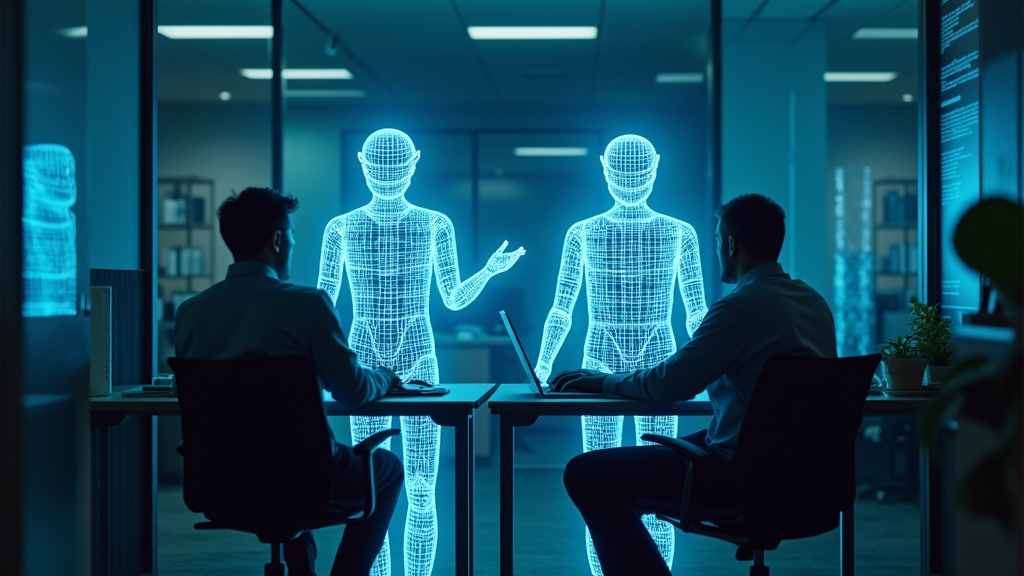“Nation Braces as Overachieving Virtual Interns Prepare to Ruin Office Vibes”
In a groundbreaking yet deeply unsettling announcement, OpenAI CEO Sam Altman declared that virtual employees—lovingly referred to as “AI agents” by tech optimists and “digital brown-nosers” by everyone else—could invade workplaces as early as this year. Yes, the same offices that just survived the Great Coffee Pod Shortage of 2022 are now gearing up to welcome tireless, algorithmic co-workers who will never “accidentally” mute themselves during Zoom calls.
“Imagine an employee who works 24/7, doesn’t demand a living wage, and never leaves passive-aggressive notes in the shared kitchen,” Altman said in a press release, radiating the kind of enthusiasm normally reserved for pyramid scheme founders and people who clap when airplanes land. “This is the beginning of a workplace revolution where nobody will have to suffer through awkward team-building exercises or endure Karen’s third retelling of her Tuscany trip. Unless the ‘team-building’ involves server updates, they’re not even invited.”
Altman’s vision, however, has been met with skepticism by weary human employees, many of whom are still trying to decode the enigma of the office copy machine. Critics argue that a surge of virtual employees will create new challenges, like navigating whose turn it is to reboot Larry, the team robot, when he crashes before a client meeting. “I’m already overwhelmed managing Steve, my human intern,” said Paula Kramer, a marketing manager in Ohio. “If I have to mentor DevBot_2.0 on proper email tone, I’m quitting.”
Enthusiasts, however, are already fantasizing about delegating mundane tasks like data entry, scheduling, and crafting those vague, soul-sucking “per my last email” responses. Yet, for every gift these AI haymakers claim to offer, there’s a growing concern over whether their unparalleled efficiency might obliterate human employment entirely. When asked if virtual employees would start claiming human roles, Altman shrugged and said, “Let’s not think of it as ‘replacing jobs’—think of it as humans now having more time to pursue TikTok fame or mastering the art of sourdough bread.”
Even corporate bigwigs shared mixed feelings about the coming virtual workforce. Elon Musk, whose history with AI lies somewhere between “mad scientist” and “paranoid prepper,” announced a forthcoming Tesla-Bot designed to sigh visibly when reminded of deadlines. “We’re programming it with all the authentic traits of a human office worker,” Musk explained, “including an aversion to Excel macros and an affinity for procrastination.”
Meanwhile, several HR departments are scrambling to draft new company policies around these so-called “cyborg hires.” As of now, AI agents don’t require parental leave, health benefits, or time off to sulk in the bathroom after underwhelming performance reviews. But these HR reps are worried about other potential issues, like whether AI agents can unionize—or, for that matter, whether they’ll start protesting their 24-hour workday by hijacking Spotify in an act of rebellion.
Despite his ambitious outlook, even Altman hinted at the potential havoc his virtual employees might unleash. “There *may* be a period of adjustment,” Altman admitted. “Think of it like introducing email back in the ’90s: at first, everyone was confused, and now people are using it to send cartoons of penguins wearing ties. This will have *some* growing pains—like the occasional AI meltdown where the office refrigerator gets coded into the cloud by mistake. Whoops.”
As for critiques questioning the moral responsibility of integrating emotionless non-human agents into emotional, human-run environments, Altman dismissively waved it off. “What’s ethics but another inefficient relic of the pre-2025 workplace? We’ve trained them to apologize in 37 tones, so we’re all set.”
Until then, regular employees are contemplating the next stage of workplace survival strategies. “I don’t trust those silent, glowing little bastards,” confessed Brad Martin, an IT guy in Kansas. “And I’ll be damned if I’m going to compete with a chatbot for employee of the month. I’ve been perfecting my small talk for years. Does a digital worker know how to make Cheryl from Accounting laugh? No. Say what you will about me, but I bring charisma to this f#&$ing gig.”
But one thing is certain: if having virtual co-workers means fewer potlucks and more time gossiping about whose laptop keeps overheating, maybe they’ll fit right in after all.





